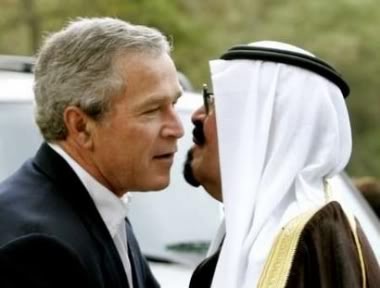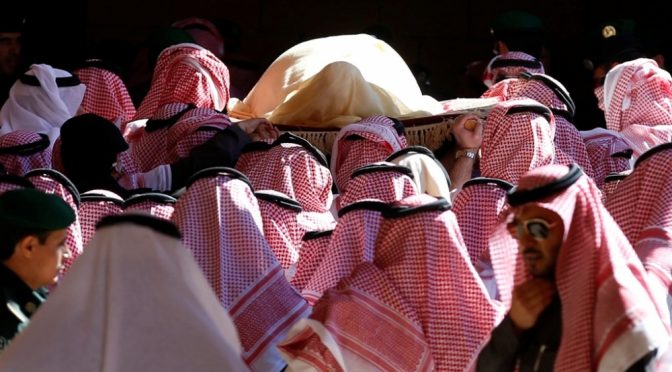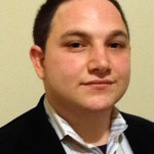Hard core Cabalists all over are singing praises for their dear departed fellow who passed away just days ago leaving behind one of the most repressive kingdoms of the modern world.
These fellow brethren in the Satanic faith are so immodest in their choice of words to the point of sounding ridiculous.
#JeSuisAbdullah? Critics slam glowing Western eulogies for ‘reformer’ King Abdullah
Edited time: January 23, 2015 21:08

Critics are taking Western leaders to task for singing the praises of King Abdullah, the recently deceased 90-year-old monarch of Saudi Arabia, whose regime they claim was marred by countless human rights abuses, warmongering and corruption.
US Secretary of State John Kerry described the late king as “a brave partner in fighting violent extremism who proved just as important as a proponent of peace.”
King Abdullah was a man of wisdom & vision. US has lost a friend & Kingdom of #SaudiArabia, Middle East, and world has lost a revered leader
— John Kerry (@JohnKerry) January 23, 2015
However, prior to a 2013 law which banned terrorist financing, Saudi Arabia had been described as “the most significant source of funding to Sunni terrorist groups worldwide,” according to US diplomatic cable leaked by WikiLeaks.
Under King #Abdullah, Saudi became "the most significant source of funding to Sunni terrorist groups worldwide." https://t.co/EFxBRXwksM
— WikiLeaks (@wikileaks) January 23, 2015
Former US Defense Secretary Chuck Hagel called Abdullah “a powerful voice for tolerance, moderation, and peace,” and lauded his dedication to “advancing the lives of his people at home as well as his country’s leadership abroad.”

Another leaked cable revealed that Saudi King had urged the US to strike Iran in order to destroy its nuclear program. Abdullah was recorded telling America to “cut off the head of the snake,” in a 2008 meeting with General David Petraeus.
The British establishment, meanwhile, remembers the King warmly, going so far as to request that flags around the country be flown at half-mast all day in honor of Abdullah. A government website notes that “local authorities are not bound by this request but may wish to follow it for guidance.”
https://twitter.com/ggreenwald/status/558602188390686720
Prince Charles has also flown to Saudi Arabia to pay his last respects to the late monarch. The Prince of Wales has made frequent visits to the oil-rich kingdom, even participating in a ritual sword dance alongside members of the royal family last year. He is believed to have been a close friend of Abdullah.
Former British Prime Minister Tony Blair said, “I knew him well and admired him greatly. Despite the turmoil of events in the region around him, he remained a stable and sound ally, was a patient and skillful modernizer of his country leading it step by step into the future.”
“He was loved by his people and will be deeply missed.” Tony Blair on the death of King Abdullah. http://t.co/BT9f5DbZpN
— Tony Blair Institute (@InstituteGC) January 23, 2015
Tony Blair praises fellow moderniser King Abdullah http://t.co/ODB0XcKEpo Well, he did subvert UK justice to stop a bribery case for his pal
— Ian Birrell (@ianbirrell) January 23, 2015
Critics note that the monarch repeatedly moved to engineer further conflict in the Middle East. For instance, Abdullah had called on the US to provide more backing to the Sunni rebels fighting to overthrow the Assad regime in Syria.
In an Elysee Palace statement, France also lauded King Abdullah’s “vision of a just and lasting peace in the Middle East.”
Despite limited efforts, characterized by Human Rights Watch (HRW) as “marginal advances that failed to secure the fundamental rights of Saudi citizens to free expression, association, and assembly,” Abdullah was unable to curtail his kingdom’s routine rights’ violations, including public floggings of dissidents and executions for sorcery.
What about funding terrorism, beheadings, flogging of journalists and women – I think Tony has a few blind spots! http://t.co/B4Uyokq1QH
— John Austin (@JohnEAustin) January 23, 2015
And yet, US Vice President Joe Biden expressed admiration for Abdullah’s “efforts to move his country forward.”
Chancellor Angela Merkel, though more measured in her praise, also voiced appreciation for the absolute monarch’s “cautious modernization of his country.”
Abdullah was widely praised in the West for sponsoring an eponymous coeducational graduate-level university, a breach of the taboo in the only country in the world where women are forbidden from driving.
Standing up for basic human rights can be challenging, if not dangerous in the ultraconservative kingdom. King Abdullah’s four daughters, for example, have been kept locked up by their father for some 13 years for speaking out against the country’s oppression of women.
“What is the crime of 99 percent of women in this country, who are basically suffering under male guardianship? A male guardian can do whatever he wants; he can cut off everything and she is left with nothing,” they told RT in an interview last year.
Despite all this, head of the International Monetary Fund Christine Lagarde went so far as to praise Abdullah as a “strong advocate for women.”
“In a very discreet way, he was a strong advocate of women. It was very gradual, appropriately so probably for the country. I discussed that issue with him several times and he was a strong believer,” she said.
Following death of King Abdullah, US should press for #humanrights reform in #SaudiArabia: http://t.co/tFIvsKCGjU #FreeRaif @SaudiEmbassyUSA
— Amnesty International USA (@amnestyusa) January 23, 2015
Last summer, HRW noted a surge in executions in the kingdom. Between August 4 and August 21, the country executed at least 19 people, eight for nonviolent offense, like drug smuggling and sorcery. Convicted criminals are usually beheaded, though those convicted of crimes of morality such as adultery can be stoned to death.
In recent weeks, thousands gathered at Saudi embassies around the globe to protest the ruling against Raif Badawi, a Saudi blogger who was sentenced to 1,000 lashes and 10 years in prison for setting up a website that undermined general security and mocked religious figures. The blogger had originally been charged with apostasy, or abandonment of religion, a crime that is punishable with the death penalty.
In spite of this seemingly appalling human rights record and sketchy foreign policy peppered with warmongering, Western leaders are putting up a united front of support for the late monarch.
Many have taken to Twitter to lambast the apparent hypocrisy of these venerating eulogies. Some have even coined the #JeSuisAbdullah hashtag, expressing wry scorn for what they believe to be a tyrant glowingly misremembered because of his country’s strategic importance to its Western allies.
https://twitter.com/c_ha93/status/558528498239668224
https://twitter.com/ggreenwald/status/558464612639973376
https://twitter.com/NHaliloglu/status/558618519848644608
Saudi Arabia foreign policy: ‘Enacted not by Abdullah, but by oligarch consensus’
Published time: January 23, 2015 13:18

Wahhabi extremism is a direct outcome of the foreign policy that the oligarch consensus in Saudi Arabia has pursued for decades, thus there won’t be any substantive policy changes, geopolitical analyst Eric Draitser, told RT.
RT: What legacy is King Abdullah leaving behind?
Eric Draitser: There are a number of things we should consider. I think the most obvious is the five hundred pound gorilla in the room, the exporting of Wahhabi extremism, the continued export from Saudi Arabia of precisely the kind of extremism that has been fought in Syria that has been fought in Iraq and all throughout the region. This specter, this global threat of Wahhabi extremism emanating from Saudi Arabia a direct outgrowth of the foreign policy that Saudi Arabia has pursued going on for decades. And it’s certainly not all at the feet of one individual, but rather I think it could be described more specifically as an oligarchy, a familiar oligarchy, but an oligarchy nonetheless. And I think that is probably the principle reason why the report there is correct in saying that there won’t be substantive policy changes because those policies were not simply enacted by Abdullah; those are enacted by an oligarch consensus in Saudi Arabia.
READ MORE: Saudi King Abdullah dead – state TV
RT: What about the new King, former Crown Prince Salman. Do you see a smooth transition of power?
ED: There could be a smooth transition of power in the sense that he seems like some kind of a caretaker, in the sense that he doesn’t seem like he is going to be prepared to actually take the reins of the state, to represent the state internationally or anything like that. If some of the reports are true I think we could ask a very obvious question of whether he is even competent enough to run this state. But again this transition I think is really secondary because it’s the seamless continuity of the policy, that we should be most concerned with. I think right now internationally people are most aware, most conscious of this question of global oil prices and oil production and oil output – this will not change this policy, this use of OPEC as a lever of Western foreign policy, this will continue. However I do think this question of what non-OPEC countries might do now is going to be very much on the table. How will Russia and Venezuela and some of these other countries seize on this moment, or will they seize on this moment to transform how the global oil markets work. I think that’s a very interesting question.
READ MORE: Oil spikes after Saudi king’s death
RT: Saudi Arabia has long been criticized for human rights violations. Are you expecting any changes in this respect?
ED: No, of course not. I mean we are talking about one of the most repressive regimes in the world; we are talking about something akin to feudal monarchy, one of the places in the world where slavery is still very much prevalent. I mean all of these very backwards notions that are really institutionalized in Saudi Arabia…especially in the Qatif provinces of Saudi Arabia with a Shiite minority – all of this oppression, all of these forms of domestic repressions will continue. The foreign policy will remain the same and sadly the problems that are plaguing the region, many of which emanate from Saudi Arabia and the other Gulf monarchies, this will remain unchanged and the conflict will continue.
RT: All eyes are on oil prices right now of course. And crude prices are already going up. How will the death of King Abdullah affect oil prices, with oil being such an important commodity for Saudi Arabia?
ED: Saudi Arabia should be understood as essentially a client state of the United States. And so that client status is not dependent on an individual ruler, that client status is still very much intact, and again for Saudi Arabia to be shooting itself in the foot with this global oil price question, continuing the output at these levels draining their own economy just for the purposes of being able to be used as a weapon by the United States against Russia. I think that this illustrates quite clearly the degree to which Saudi Arabia is still within the orbit of the United States and that’s not changing either.
MORE:
[soundcloud url=”https://api.soundcloud.com/tracks/187468093″]
source »
A monster dies and the world mourns
| January 23, 2015
We may never again have such an opportunity to observe the West’s paramount value — hypocrisy — showcased in glitter, tinsel and neon quite so spectacularly. In the U.K. the government has ordered that all flags be lowered to half-mast. U.S. Secretary of State John Kerry sucks hard enough to implode. Here at home, our Prime Minister sings Abdullah’s praises: “the monarch also undertook a range of important economic, social, education, health, and infrastructure initiatives in his country.” Just another Economic Action Plan, with a few cut limbs and rolling heads. What’s not to like?
Under this bloated tyrant, women have been arrested for the crime of driving. A blogger has been sentenced to 10 years and 1,000 lashes for cautiously endorsing mildly liberal values. But these are, comparatively speaking, mere peccadilloes, a few national idiosyncrasies.
During Abdullah’s kingship, assisted by countless parasitic family princelings and a tame and compliant judiciary, a reign of terror has prevailed. There have been mass arrests of dissidents since the Arab Spring. Atheists have been declared “terrorists,” emptying that label further of any meaning. Amputations are routine. Surgical paralysis has been ordered in one egregious case. And there are enough beheadings to sate the most seasoned ISIS psychopath. In Saudi Arabia, you can be publicly decapitated for such “crimes” as sorcery, false prophecy and blasphemy. Between 2007-2010, there were 345 of them. And the numbers have surged in recent years.
Hypocrisy abounds on the Right side of the aisle, too — now they’re saying pretty much what this post is saying, but as a stick to beat Obama with. They would like us to forget this sort of thing:
 Recall, also, that 15 of the 9/11 flyboys were Saudi, but somehow Bush got away with continued support for the Saudi regime, and the double-thinking Right commentators were silent.
Recall, also, that 15 of the 9/11 flyboys were Saudi, but somehow Bush got away with continued support for the Saudi regime, and the double-thinking Right commentators were silent.Weigh the official rhetoric against the reality: this time, our Western leaders are making it childishly easy. Abdullah’s death is one of the best teachable moments, in fact, that I can recall. This vile creature squatted on his people, one of the worst dictators we could ever conjure from a fevered dream. We’re all for freedom, of course, when it comes to state-defined “enemies.” But when it’s friends, anything goes: our governments judge by a completely different standard, if “standard” is the proper word, when access to oil or geopolitical strategic advantage is concerned. There is no act too heinous to be wished away, no viciousness that cannot be airily excused.
We’ll get no phoney ambassadors of religion showing up to criticize the treatment of Saudi Arabia’s Shia minority. Our government’s oh-so-pious defence of human rights abroad will vanish into thin air. Saudi Arabia is an ally, its dearly departed leader a “moderate reformer.” He supposedly offered women a public role (they were permitted to run in meaningless municipal elections), but they were still not allowed even to be behind the wheel of a car. He had 13 wives, but, we are assured, no more than four at once.
None of the West’s fawning will be any surprise to students of Realpolitik, of course. But for the majority who dutifully swallow all the nonsense about “terrorism” that our governments spew by the barrel, and profess moral outrage when they are directed to do so, the current period of state-sanctioned mourning for a monstrous criminal who ran a medieval torture-state for a decade might be a welcome wake-up call. There is surely a limit to what such excruciating political cognitive dissonance can bear. Isn’t there?
source »



